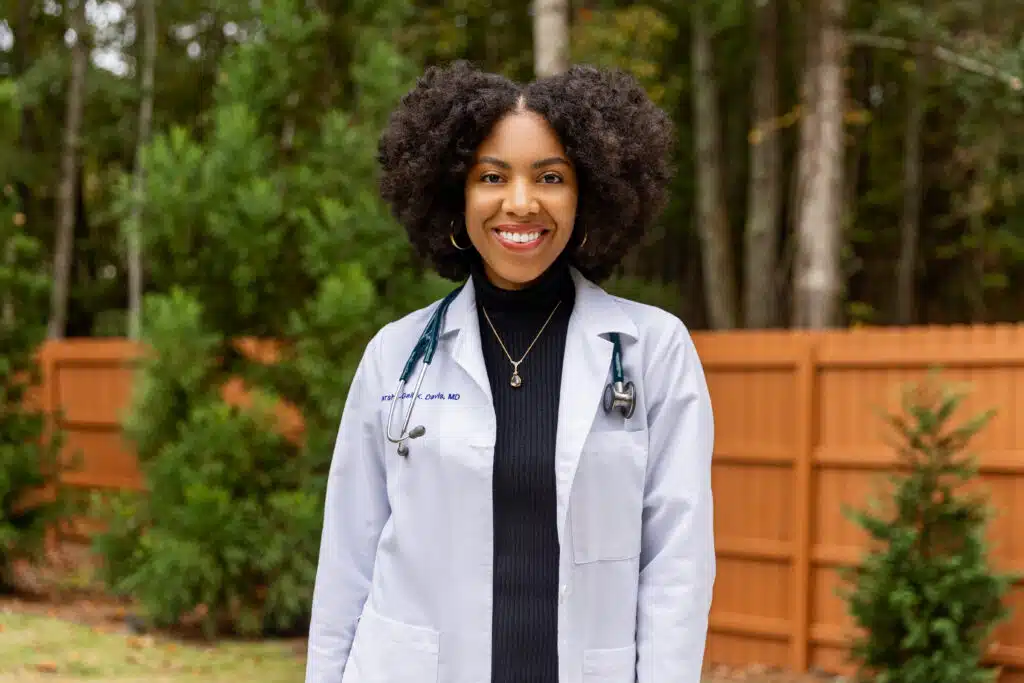Health care, not sick care: Giving patients what they really want
Dr. Marsha-Gail Davis became a physician to promote health and to treat and prevent disease. Instead she found herself working in a healthcare system better suited to illness and symptom management.
But patients don’t want “sick care” any more than clinicians want to provide it. Systemic changes will take time but Dr. Davis shares ideas about impactful things we can do now, both as clinicians and individuals, to advance health equity.
By Marsha-Gail Davis, MD, MPH, DipABPM, DipABLM, DipABOM
February 12, 2024

High blood pressure, high cholesterol, fatty liver disease, heart disease, stroke, osteoarthritis, chronic pain, type 2 diabetes and its microvascular complications that lead to vision loss, nerve damage, and end-stage kidney disease.
These diagnoses are just a snippet of the many medical conditions I learned about in medical school. While just a snapshot of my medical school curriculum, make no mistake that the burden of chronic disease is heavy. Physicians and healthcare professionals are considered by their patients to be the primary source of health and dietary lifestyle prescription. However, the reality is that medical professionals receive very little, if any at all, training in clinical nutrition or physical activity and other lifestyle therapeutic interventions that address the root cause of the very diseases mentioned above.
Most of my patients have one chronic disease. According to the U.S. Centers for Disease Control and Prevention (CDC), six in 10 American adults have a chronic disease. Close to half of my patients have more than one chronic disease. According to the CDC, four in 10 American adults have two or more chronic illnesses. Most of my patients are challenged by excess weight that puts them at risk of developing chronic disease in the future and dying early. According to the CDC, 70 percent of American adults are overweight and obese. These statistics come to life every day when I see my patients, many of whom are disproportionately impacted by chronic disease simply because of their zip code. It becomes even more visible asI practice in an area of the U.S. with one of the highest rates of disease.
Healthcare, here’s your diagnosis
When you take a step back and start to really look at the healthcare system from a big-picture lens, it also appears to be suffering from a chronic disease. Multiple symptoms are popping up and diagnoses are being made. Treatments are provided to limit the symptoms, but the disease continues. Symptoms include health disparities and health inequity, provider burnout and suicide, mass resignation due to a feeling of dissatisfaction and a lack of work-life balance. There are shortages of primary care doctors and staff, a near breakdown of care during COVID-19 pandemic, massive loss of valuable life during the pandemic due primarily to a baseline of chronic disease and health inequity and even more profound, the mass loss of valuable life from chronic preventable disease every year, every hour, every minute and every second. Not to mention patients feel dissatisfaction and distrust.
As a primary care physician, I’ve experienced these symptoms too. Working long hours just to come home to complete notes from that day’s patient visits, loads of paperwork and patient messages that await after vacations, and staff shortages for LPNs and CMAs that put a strain on everyone, patients included. Too often I have to say “sorry grandma, sisters, mom, niece and nephew, friends, I’ll have to chat or hangout with you another time because I have too much spillover from work to finish.” These symptoms indicate that our healthcare system is not functioning optimally. It is not doing well. It is, like many patients with chronic disease, unhealthy.
What do our patients and health professionals really want?
What I have learned when I listen to my patients is that they, in fact, do want something different. They WANT health care, but receive “sick care.” They WANT to focus on prevention, but get pills and procedures. They WANT to age with more life in their years instead of die with more disease in their bodies. At the same time, when I connect with my colleagues, they also want something different. They WANT to spend more time listening, but get more paperwork. They WANT to counsel patients on how to improve their health, but can’t get paid properly to spend the time to do so. The healthcare system currently is NOT focused on what BOTH patients and providers want.
Patients don’t want this type of care and doctors don’t want to provide it. Patients actually want to be well and providers want their patients to be well. Both patients and healthcare professionals are carrying the burden of a system that isn’t giving true health and healthcare. We just want what the word itself communicates in 10 letters. We want healthcare to ACTUALLY care for health.
From WACK to Act
I went into medicine to promote health and prevent disease yet so much of what I saw was centered on a healthcare system focused more on illness and symptom management. I was conflicted and honestly disturbed, and penned my frustration into what became a poem titled “WACK!.”
While I am on the front lines of primary care as a PCP, I take pride in community efforts that advance a healthy and healing lifestyle outside the hospital or clinic walls. WACK!, now a song sheds light on the health challenges we face as a society as well as the challenges of educating the public about healthy living and disease prevention. It’s a modern-day public service announcement that calls for systemic changes to the healthcare system and the activation of our individual and communal agency to make change so that all people can thrive and live a full quality of life.

How can we “act” now?
It’s no secret that change on a systemic, policy level takes time. That doesn’t mean we wait idly on the sidelines. There are impactful things we can do now, both as individuals and clinicians and as organizations, to move the needle on advancing health equity, which means health for all people.
ACLM’s HEAL Initiative Scholarship Program is one example of doing exactly that. It was designed to diversify the workforce and to provide needs-based assistance to underrepresented in medicine (URM) clinicians who are advancing lifestyle medicine in communities of need. To date, ACLM has awarded three cohorts with HEAL scholarships. More than 80 percent of clinicians from all three cohorts have passed the American Board of Lifestyle Medicine exam and are now certified in lifestyle medicine, incorporating practical lifestyle medicine solutions that are creating better health outcomes for patients living in some of the nation’s most underinvested and marginalized communities.
Over the years, I’ve had the opportunity to meet these scholars and learn about their efforts and passion for addressing lifestyle-related chronic disease health disparities. It is inspiring! I am looking forward to the next cohort of awardees, whom ACLM will be announcing in the next few months.
Another ACLM scholarship opportunity is the Lifestyle Medicine National Training Initiative Scholarship Program, designated for primary care physicians working within Federally Qualified Health Centers (FQHCs) or Community Health Centers (CHCs). This newly launched scholarship complements the HEAL Initiative Scholarship, especially since FQHC/CHC entities primarily serve some of the nation’s most underserved communities. With training and resources in lifestyle medicine, practitioners from health centers nationwide will have the tools to better support patients who are at a higher risk for chronic disease.
Learn more about the HEAL Initiative Scholarship Program and the Lifestyle Medicine National Training Initiative eligibility requirements and application deadlines.